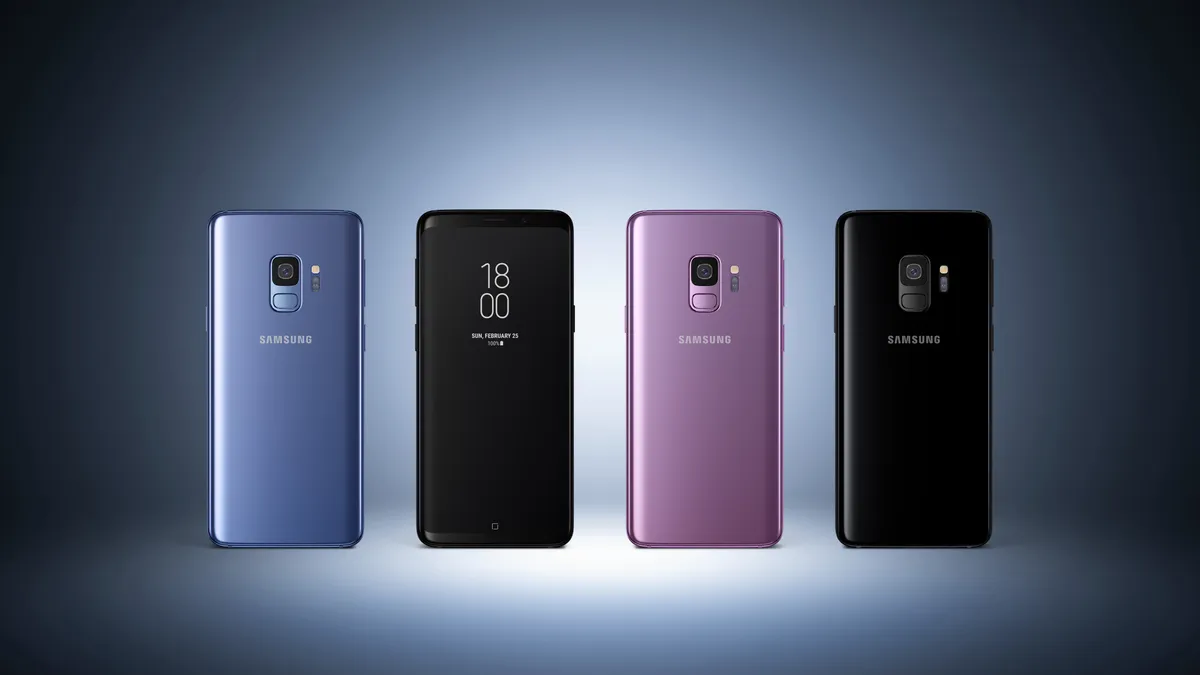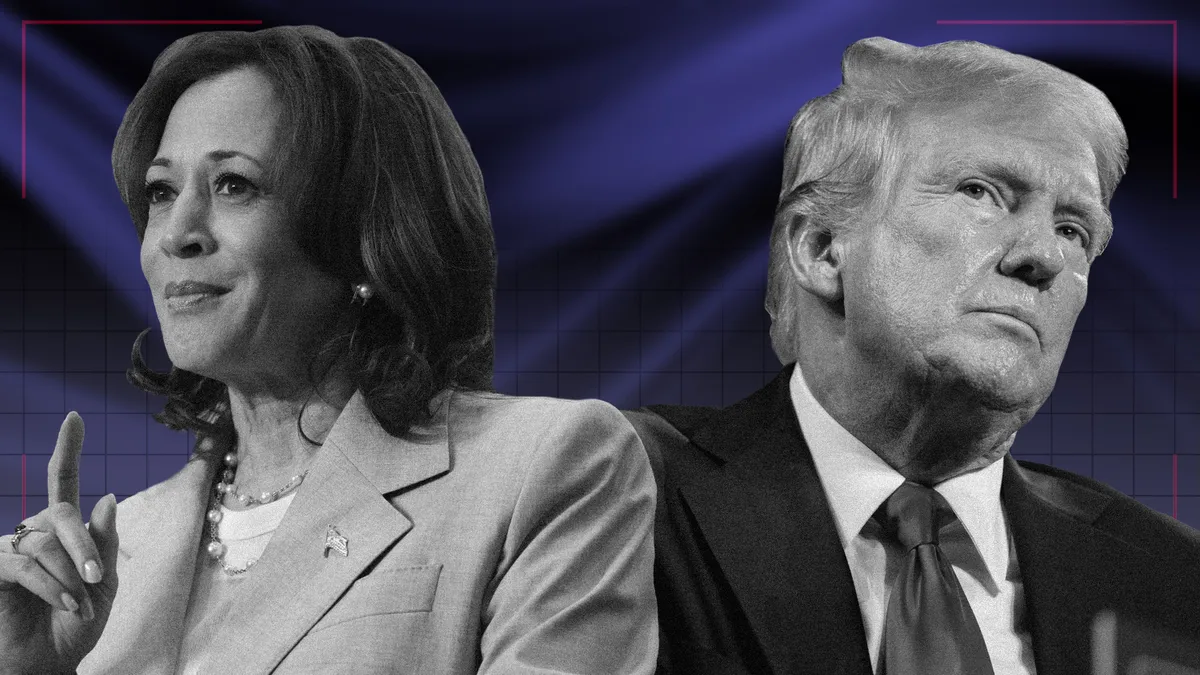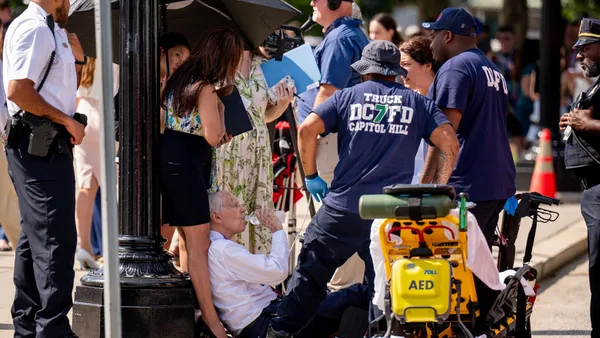For an electronics company like Samsung, innovation is traditionally something that can be held and felt. New devices spark excitement among consumers, resulting in new sources of revenue for the company. But what if there were ways to expand beyond hardware?
Six years ago, David Eun recognized an opportunity to open new markets, new sources of revenue and new users by developing an organization that would spark innovation at Samsung and enhance the capabilities of the hardware devices. Eun eventually founded Samsung NEXT as a way to "bridge the gap between innovation and the mothership, being Samsung," Christina Bechhold Russ, a principal for Samsung NEXT Ventures, told Smart Cities Dive.
Samsung NEXT is now a thesis-driven organization that analyzes where markets will be moving "three, five, seven, 10 years from now," and then identifies the entrepreneurs and software companies who will flourish in those markets. From digital health to augmented reality (AR) to first responder services, almost all of the markets touch on a common trend: smart cities.
Smart Cities Dive sat down with Bechhold Russ during South by Southwest (SXSW) in Austin, TX to learn how the company is making strategic early-stage investments that can shape the future of cities and make us all a bit more connected.
This interview has been edited for brevity and clarity.
SMART CITIES DIVE: What's the strategy behind figuring out which markets to invest in? How do you really look ahead three, five, seven years and figure that out?
BECHHOLD RUSS: It's a combination of megatrends that we observe in the world. There's obviously lots of discussion and content available now about what people are thinking and feeling and creating, so that's part of it, just understanding what the conversation is around technology and what people are excited about. And then taking a view on what we think the world should look like and how we can help to enable that.
But then obviously a big piece of it is what is relevant to Samsung. What are the products and services that Samsung is building? We're very fortunate because we have access to a market maker. We can go to the leadership in Korea or someone here in the U.S. who's leading a division and say "Hey, this is what we think is happening. Do you agree with that?" And then we try to pair those two together because we want to be thesis-driven and we want to be pushing the boundaries of where we think technology is moving and stay close to that, but then we also make sure we continue to stay relevant to Samsung. On an annual basis, we are refreshing our theses, adding new ones, dropping ones maybe we were wrong about.
Do you have any examples of theses that didn't pan out the way you expected?
BECHHOLD RUSS: Emerging markets was one that I spent a lot of time on a couple of years ago, and I still think there's obviously a huge opportunity, there's no denying that emerging markets are where population growth is going to come from, it's where all the new users are of mobile devices. But I think in terms of how quickly that market's going to develop, it's going to be a slightly longer timeline than maybe I had anticipated in terms of how it can be relevant to Samsung.
Can you share your thoughts on the struggle that cities might face when trying to select one vendor out of a pool of companies that have great services and offerings?
BECHHOLD RUSS: Part of it is identifying some partners that you trust early on. Those may not be the people who are peddling the specific solutions that you're considering, but partners or individuals in the space whose opinions you trust and who are themselves doing a lot of tracking of what are the interesting companies, what are the interesting technologies, what are cities in the Middle East doing that we could learn from in Washington DC, for example. So finding a couple trusted advisors I think is really helpful, who actually come from the technology ecosystem, are thought leaders in the smart city space, where it's their job to sort of stay on top of what's going on so that you have someone that you can ask an opinion of and who frankly can be the one to draw your attention to something that you may not have known about otherwise.
I think more broadly, there are just so many individual solutions that are trying to sell into governments and public sector. It's really, really hard for any startup or small business to break in. And it's a very fragmented market. Every town, every city, every county, every state is going to have a whole host of different things that they're considering, different priorities, so I think that's a really hard proposition for a startup. So to the extent that you can either find or engage someone who can bundle solutions together for you, I think that's a really valuable service.
For better or worse I think startups are going to have to find ways to meet those bundlers and then be sold in as part of a larger package. There aren't a lot of things, at least that we've seen, where it's a single platform that can add enough functionality across all the different verticals from public safety to utility to transportation, where you can add one single solution with a whole suite of services. And it's just really, really hard to be one small company trying to sell one specific thing into what is a very complicated system.
The hottest trend right now is the urgency of 5G deployment. How have you seen 5G having an impact on the startups you're investing in and how they're working with cities?
BECHHOLD RUSS: One thing that we've spent a lot of time on is trying to help our networks group identify the companies that are best in class around particular use cases in smart cities, transportation and 5G. The timeline on deployment of 5G I think is up for debate. The density of infrastructure required to roll out 5G is sort of terrifying. If I were the project manager for that, I imagine it'd be a terribly stressful planning and deployment job.
You're obviously gonna see it in certain high-density areas first before it gets rolled out more broadly. So we're trying to figure out what are some best-in-class examples of early-stage companies that could leverage 5G to make their solution that much faster, more impactful, more useful in urban landscapes. Then hopefully our networks group can go and show those to all of their customers and the individuals they're engaging with at a higher level to say here are the areas that we think could be really impactful as first steps in deploying 5G services.
And then you can start to prioritize, what do I focus on around 5G first? Do I start with transportation? Is that the most important need for my city? Is it more around utilities and IoT? Is that really critical for my infrastructure? What do my residents need and where can I find a deployment or a solution that is well-tested, highly reliable and can be quickly deployed?
How do you see AR transforming cities?
BECHHOLD RUSS: All the things that I've spent my time running around Austin Googling this week are things that I think AR could be incredibly impactful for in urban centers in particular. There are some really interesting buildings in Austin and I walked by one and I thought "Oh, I'm really curious about that building, what's the history behind it?" So you try to Google things, and you sort of hope that something comes up.
AR's one of those things, you could walk down the street and throw your phone up and it could pop out an information bubble about [a building or store]. We were trying to find a place to grab coffee to chat. I could've just gone down the street and thrown my phone up looking for a coffee shop and then had a whole bunch of arrows point and tell me what to do.
The availability of data in a new interface I think is incredibly exciting. And to me, I think that's going to be the first area we see interesting innovation and actual deployments because they're consumer applications and services. A lot of the data already exists online and so it's more about porting it into a new modality, and then maintaining it.
Samsung NEXT recently invested in RapidDeploy. I know Samsung is also involved with AT&T's FirstNet initiatives. What is the importance behind investing in first responder networks and what is the cost benefit?
BECHHOLD RUSS: So RapidDeploy is part of a couple of theses for us, one around smart cities but another around mobile enterprise SaaS, which I consider the next frontier in enterprise SaaS.
When you think about most of the tools that have been built in that space to date, they're made for people who sit at computers. When you think about the opportunity and sort of the forgotten market segment, it's around non-desk workers and blue collar workers. People who work in manufacturing or first responder or construction or even like hospitality and retail. No one builds technology for those segments because frankly most people build technology have never had those jobs. So it's a completely forgotten workforce even though it's actually the largest segment of the workforce in the world. Something like three or four times as many non-desk workers as desk workers.
The solutions that they do have, particularly in the first responder space, are just very antiquated. These are systems that were built decades ago and really have very little incentive to innovate. And the response times are not as fast as they could be if you employ cloud based technology. RapidDeploy is leveraging data analysis so that you can track where events may happen in the future and how can we prevent them. Using big data, those are things that are not currently done in that industry. So we're really interested in finding companies that are solving the needs of these kinds of workforces that have just been overlooked as a market opportunity.
We talked about how the buzz is around 5G this year. Looking ahead to 2020, 2021, what do you think the next big trend will be?
BECHHOLD RUSS: Once 5G is deployed, I think what's going to be interesting to see is which are the use cases that people actually adopt for 5G. There's obviously an endless number of opportunities for how you could leverage 5G in cities, but again to my earlier point, what do the most influential cities in the space choose? And how does that influence what gets deployed elsewhere in smaller cities?
You look at places like Singapore or Dubai, and they're actually a great testbed because the government fully controls what gets done. And so keeping an eye on places like that and what they choose to leverage first I think will have a big impact on what St. Louis or Kansas City or Seattle decides to go with. Because they're going to be the test beds for how 5G actually gets leveraged and utilized.
I don't necessarily know what would be the initial use cases that not only cities are interested in but also that citizens really respond to. You can deploy lots of things but if it doesn't actually get utilized and make people's lives better and improve their quality of life, which is the purpose of all this stuff, then it doesn't matter. What consumers and residents ultimately respond to, I don't think anyone knows yet.











